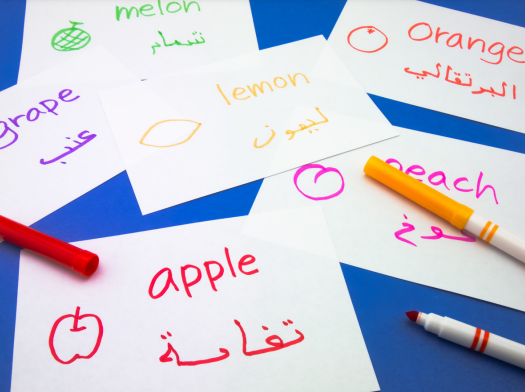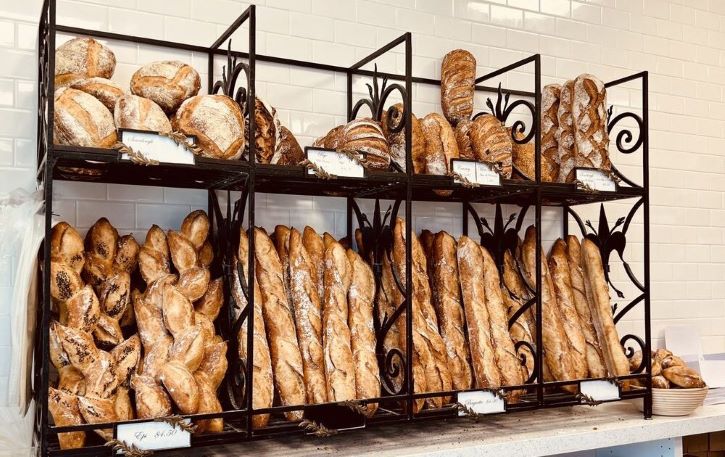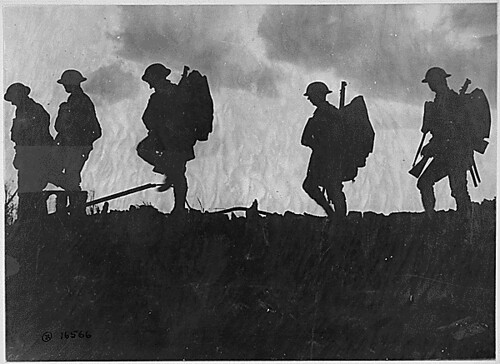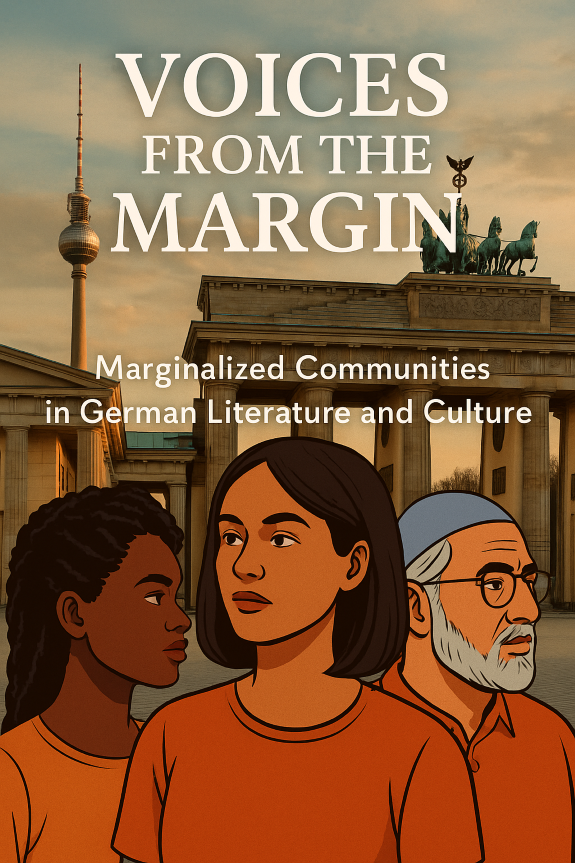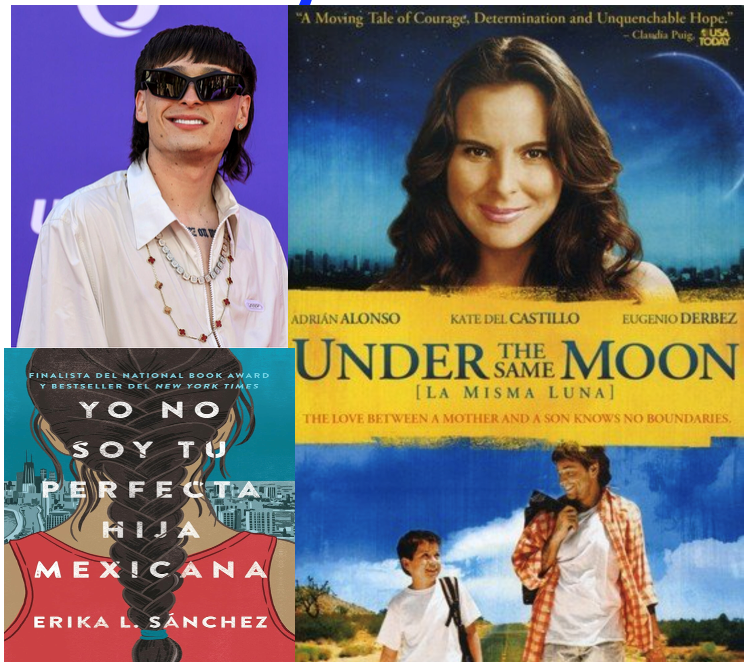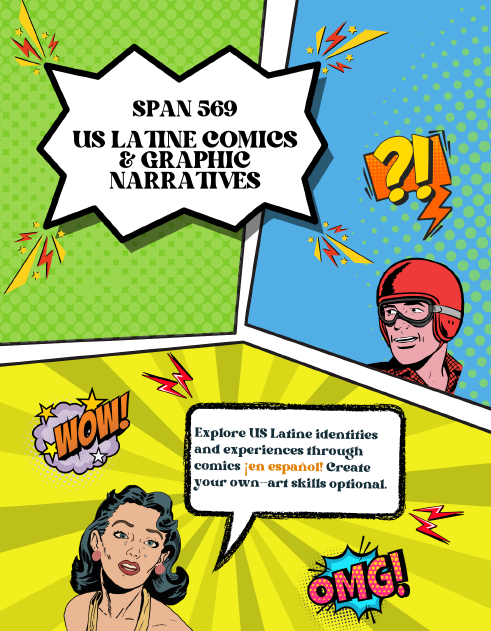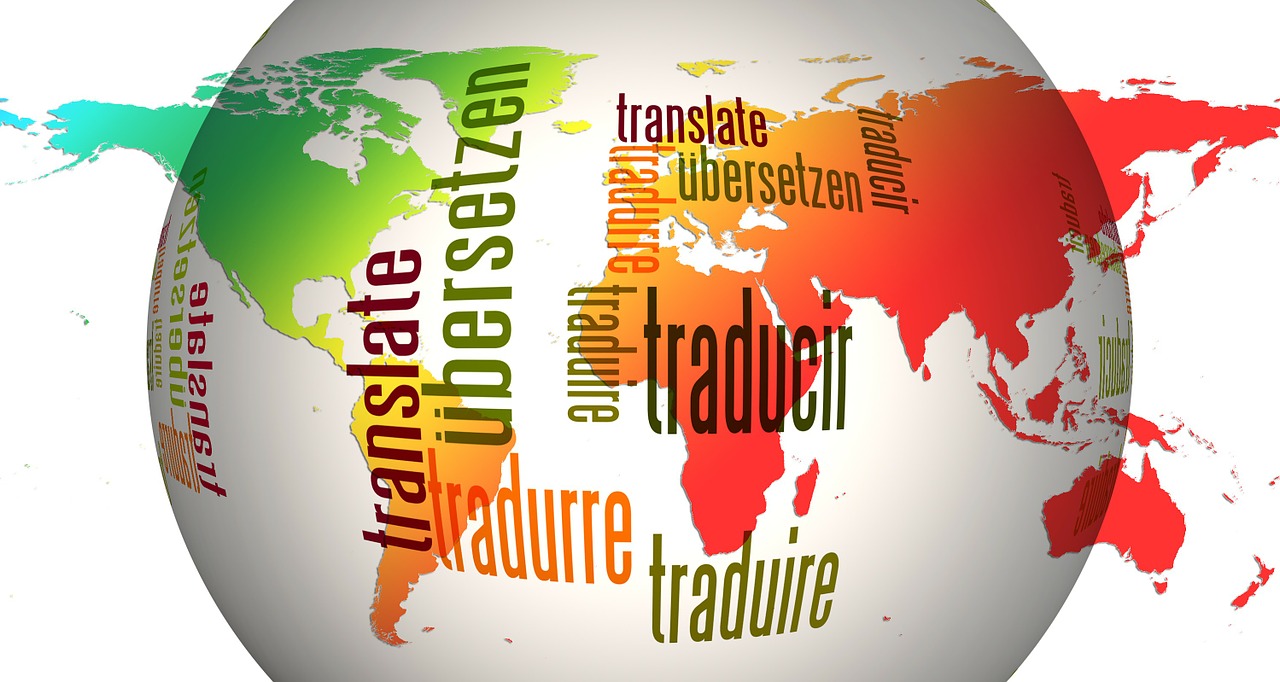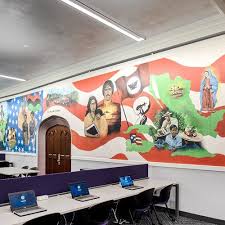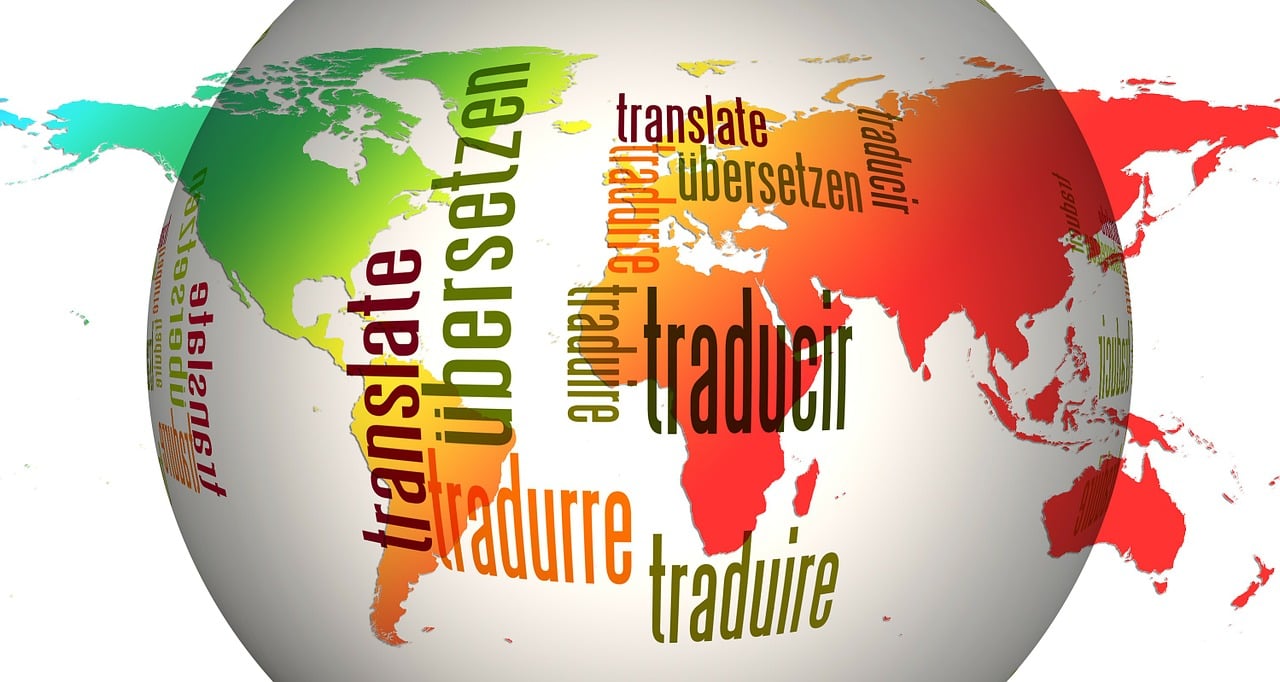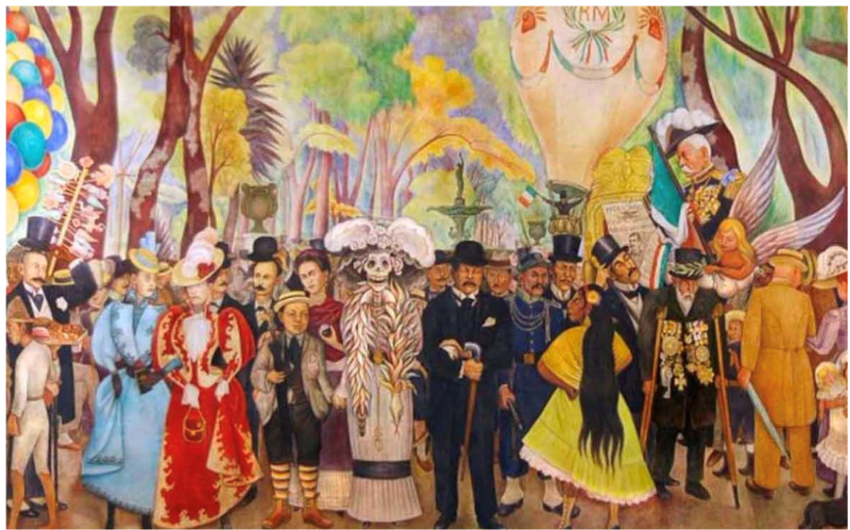- K-State home
- Modern Languages
- Academics
- Areas of Study
- Course Descriptions Spring 2026
Modern Languages Course Descriptions - Spring 2026
Unsure where to start? Visit us during Open Advising hours in the KLC (EH 001), to learn about our language placement, programs, study abroad, scholarships, and more.
Many of our courses count toward language minors and majors, but also the Primary Text Certificate or the Linguistics Certificate, as well as many K-State Core requirements, such as #6 - Arts & Humanities; #7 - Free Electives, Fine Arts, U.S. Multicultural Overlay, Global Perspectives Overlay
Course Descriptions by Language
Click on the links below to see a description of our courses in all languages, day/times offered, and requirements fulfilled by these courses. Please note that all of our courses are 3-credit courses, unless otherwise specified.
Modern Languages Line Schedule Spring 2026
|
ARAB 101 - Arabic I
In-person and online |
The aim of the first half of this course is to learn the shapes and sounds of Arabic letters and vowels and develop the ability to write and read words and numbers. The second half of the course focuses on introducing basics in Arabic grammar essential to compose short, common phrases for communication. Sets of vocabulary that include pronouns, verbs, nouns, adjectives, prepositions and question words will be covered that enable construction of short, meaningful phrases and sentences in oral and written communications.
|
|
ARAB 102 - Arabic II
In-person and online |
This intermediate Arabic course focuses on developing skills in text reading, understanding written and spoken Modern Standard Arabic and in writing and speaking more complex sentences. Emphasis will be on memorizing current usage vocabulary, and understanding details of the principal grammatical rule communications. used in formal.
|
|
ARAB 301 - Arabic IV
In-person and online |
Arabic 4 focuses on further advancing communications skills in Arabic language through reading and listening comprehension and conveying information through speaking and writing. About 1500 new words in formal Arabic will be studied to add to the vocabulary inventory already acquired in previous courses. Students will rely increasingly on their cumulated learning to translate reading and listening passages and ask, answer and express thoughts in Arabic. In addition, various aspects of the Arabic and Islamic cultures and traditions will be mentioned in relevance to the language topics covered in the course. This advanced course focuses on the ability to communicate confidently and gain more understanding of the different cultures and practice within the region of the Middle East.
|
|
CHINE 200 - Chinese II
|
Continuation of Chinese 1. In this course, you will learn to converse on more varied conversational topics in Chinese; engage in basic reading and character writing practice; and become familiar with the traditional Chinese festivals and their customs. Counts toward:
|
|
CHINE 301 - Chinese IV
|
Continuation of Chinese 3. In this course, you will learn to handle communicative scenarios with complications; prepare collaborative, oral presentations on lesson topics; practice extensive reading and engage in more descriptive and expository writing; and enjoy popular Chinese TV dramas. Counts toward:
|
|
CHINE 502 - Chinese VI
|
Further enhancing students’ language skills with a manageable degree of challenge and deepening their understanding and discussion on cultural and social aspects about China. In this course, you will discuss social issues in or related to China; read newspaper articles with guidance; complete individual, oral projects to express opinions and propose suggestions on social issues in China; and engage in more argumentative writing in Chinese. Counts toward:
|
|
CLSCS105 - Latin and Greek for Scientists online asynchronous |
The course is designed specifically to provide students of the biological sciences a background in Latin and Greek roots of scientific terms. Emphasis on prefixes, suffixes, and word derivations. No prior knowledge of either Latin or Greek is required.
|
|
LATIN 102 - Latin II
|
Continuation of Latin 101. Students will continue developing their language skills by reading an (adapted) Roman play. Counts toward:
|
|
LATIN 302 - Latin IV
|
Continuation of Latin 201. In this intermediate level reading course, students will build familiarity with a specific author of Latin poetry (e.g., Ovid, Plautus, Vergil). In addition to building their skill with Latin, students will explore questions relating to authorship, genre, and cultural and historical context. Counts toward:
|
|
FREN 101 - French I Offered Fall and Spring |
Designed for students with no prior French language experience, or less than one year of prior language study. Students will develop basic language skills and cultural awareness to discuss daily habits, personal information, and communicate in simple everyday situations in French-speaking communities. Conducted in French through speaking, listening, reading, and writing activities.
|
|
FREN 102 - French II Offered Fall and Spring |
Continuation of French I. Designed for students with one semester of college French or 1-2 years of high school French. Students will build on basic language skills and cultural awareness to relate personal experiences, give recommendations, and interact in uncomplicated situations in French-speaking communities. Conducted in French through speaking, listening, reading, and writing.
|
|
FREN 103 - Beginning Accelerated French Offered online, summer, on sufficient demand |
Jump start your French learning, or get a quick review of beginning French concepts, in this accelerated French class. This online course covers the material of French 1-2 (101-102) in a single course, allowing you continue your French journey with French 3 (FREN 201). This course is designed both for motivated beginners and for students wanting a review of foundational French concepts in an active environment, focused on improving your spoken and written French. Students will develop basic language skills and cultural awareness to discuss daily habits, personal information, and communicate in simple everyday situations in French-speaking communities. Conducted in French through speaking, listening, reading, and writing.
|
|
FREN 201 - French III Offered Fall and Spring |
Continuation of French 102. Designed for students with two semesters of college French or 2-4 years of high school French. Enhances skills in reading, listening, speaking, and writing to express themselves creatively in French in straightforward social situations. Students engage with and analyze a variety of content including films and short stories. Conducted in French.
|
|
FREN 301 - French IV Offered Fall and Spring |
Continuation of French 201. Designed for students with three semesters of college French or 3-5 years of high school French. Overall review of grammatical forms and development of reading, writing, listening, and speaking skills in cultural contexts. Conducted in French.
|
|
FREN 503 - French Composition & Grammar
|
Grammar and Composition through reading This course aims at the study of French grammar and writing through reading. This course allows students to strengthen their linguistics skills in French and combines multimodal compositions in a variety of genres (e.g., description, narration, etc.) through the study of texts taken from real-world Francophone contexts with applied learning experiences.
|
|
FREN 515 - History of French Culture
|
History of Francophone Culture through Food In this French language and culture course, students will analyze and interpret the importance of food and gastronomy and its history in the French and other Francophone cultures while participating in a range of oral and written communicative activities. Through a variety of literary texts from authors; through film clips; and through other multimedia resources, students will recognize the interdisciplinary and pervasive nature of food systems, the food industry, food practices, and food culture.
|
|
FREN 716 - Topics Contemporary French Literature
|
Topic: War, trauma, and the self This course explores French literature since 1900 with a particular focus on narratives of war, trauma, and the self. Through poetry, prose, theater, and film, we will discover the developing ways that French authors found to tell stories about themselves and their experiences. This course is in French. It is appropriate for students who have taken at least one course at the 500-level. It counts for the literature requirement for the French major or minor. This course will work on developing reading, writing, listening, and speaking skills while reading (relatively short) literary texts in French. It is a 700-level course, so we also develop skills in reading secondary sources.
|
|
FREN 731 - Advanced French for the Professions |
Working and Living in French This course will emphasize the vocabulary, cultural knowledge, and linguistic skills and tools that you will need in order to succeed by defining the key role of gender, race, and foreignness (or immigrant status) in determining success in (and barriers to) the French work environment, articulate how the histories and hierarchies shape power dynamics inherent to French and Francophone institutions in France and beyond, and examine cultural artifacts depicting French work culture.
|
|
GRMN 101 - German I Offered Fall and Spring |
This interactive course is for students with no previous experience in German. Students develop basic language skills and explore cultural products and practices of the German-speaking world. No-cost, open access textbook.
|
|
GRMN 102 - German II Offered Fall and Spring |
In 102, students become more familiar with basic structures of German and continue developing cultural knowledge about the German-speaking world. No-cost, open access textbook. Designed for students with one semester of college German or 1-2 years of high school German.
|
|
GRMN 201 - German III Offered Fall and Spring |
In 201, students expand their vocabulary and become familiar with more complex grammar. They read and analyze texts and videos and engage in discussion. Designed for students with two semesters of college German or 2-4 years of high school German.
|
|
GRMN 301 - German IV Offered Fall and Spring |
In 301, students read, interpret, and discuss longer German texts, extending the focus on language and culture. Students research various aspects of the history and culture of German-speaking countries and learn to write about and present the results of their research. Designed for students with three semesters of college German or 3-5 years of high school German.
|
|
GRMN 526 - Business German
|
German for professions and business! Learn the communicative skills, the languages, and cultural competencies pertaining to the world of German business and other professions. Create a German resume and application letters, read texts, develop interview skills, learn about structures of organization and field-specific vocabulary. Course will focus on German communicative skills, cultural competencies pertaining to the world of business and other professions. Course includes reading and creative components.
|
|
GRMN 705 -
|
This course explores marginalized voices in German literature and culture, focusing on representations of Afro-Germans, Turkish Germans, and other communities often excluded from canonical histories of literature. Drawing from literature, film, autobiography, and cultural criticism, students will examine identity, memory, nationhood, and belonging in historical and contemporary German contexts. Anchored in critical race theory, postcolonial theory, and memory studies, the course engages with both German-language and English-language materials to foster advanced linguistic and analytical skills.
|
|
JAPAN 200 - Japanese II
|
This course builds on the basic grammatical patterns and syntax of the Japanese language acquired in Japanese I. Through highly interactive in-class activities, students will further develop their comprehension (listening and reading) and production (speaking and writing). Students are also taught how to use helpful strategies to enhance their learning.
Counts toward:
|
|
JAPAN 301 - Japanese IV
|
This course is designed to further develop the four language skills in Japanese (listening, speaking, reading, and writing). Students will gain necessary skills and develop not only their linguistic competence but also their communicative and cultural competence. For example, they will start learning to use Japanese honorific language in various social contexts. Counts toward:
|
|
JAPAN 502 - Japanese VI
|
Development of practical communication skills will be sought through application activities. Deeper understanding of Japanese culture and better command of the Japanese language are enhanced through advanced grammar, vocabulary, sentence structures, as well as proverbs, idioms, and their usage. Active participatation in a variety of communicative tasks, work creatively and cooperatively with your classmates to co-construct your knowledge and develop your Japanese language skills. Pre-req: JAPAN 501. Counts toward:
|
|
MLANG 301 - Languages and your Future Online asynchronous Offered Fall & Spring |
MLANG 301 is an online language proficiency assessment course for Education majors preparing to take the Praxis exam |
|
| MLANG 803 - Practicum |
This course focuses both on an overview of current issues and methodology in TEFL and provides a foundation for further exploration of teaching techniques used in skill specific areas of oral and written communication (i.e., listening, speaking, reading and writing). This course is aimed at providing students with training in TEFL for adult learners. Students will acquire specific content and practice in defined skill areas. |
|
SPAN 101 - Spanish I Offered Fall, Spring, Summer In-person and online |
Students will develop basic language skills and cultural awareness to discuss daily habits, personal information, and communicate in simple everyday situations in Spanish-speaking communities. Conducted in Spanish through speaking, listening, reading, and writing. Designed for students with no prior Spanish language experience, or less than one year of prior language study.
|
|
SPAN 102 - Spanish II Offered Fall, Spring, Summer In-person and online |
Continuation of Spanish I. Students will build on basic language skills and cultural awareness to relate personal experiences, give recommendations, and interact in uncomplicated situations in Spanish-speaking communities. Conducted in Spanish through speaking, listening, reading, and writing. Designed for students with one semester of college Spanish or 1-2 years of high school Spanish.
|
|
SPAN 201 - Spanish III Offered Fall, Spring, Summer In-person and online |
Enhances skills in reading, listening, speaking, and writing to express themselves creatively in Spanish in straightforward social situations. Students engage with and analyze a variety of multimedia content such as spoken word poetry, debates about telecommuting, cultural customs, and stereotypes. Designed for students with two semesters of college Spanish or 2-4 years of high school Spanish.
|
|
SPAN 301 - Spanish IV Offered Fall, Spring, Summer In-person and online |
If you're taking Spanish 4 and need to take an Orientation course, check out DAS 101 ¡K-State en español! This course reviews and expands on knowledge of language forms developed in Spanish I-III and serves as a bridge to more advanced language, culture, and literature courses. Students will further develop communicative skills and strategies to describe, narrate, research, analyze, and opine in increasingly complex social situations. Conducted in Spanish. Designed for students with three semesters of college Spanish or 3-5 years of high school Spanish.
|
|
SPAN 410 - Spanish Communication through Pop Culture Offered Fall and Spring |
Spanish Communication through Pop Culture is a new approach to SPAN 410. In this course, we will improve spontaneous conversation in Spanish through impromptu discussions, word games, partner conversations and more! We will improve our writing skills through creative writing prompts, peer-review and writing workshops with your instructor. We will also learn how to activate language absorption through authentic input by listening to music, watching documentaries, tv shows and films, and reading short stories and graphic novels in Spanish. Pre-Req: SPAN 301 or equivalent.
|
|
SPAN 531 - Professional Spanish: Health and Human Services
|
To develop advanced Spanish-language proficiency and cultural competence for real-world communication in health, social work, and human services professions. This online Spanish course develops professional language skills for health and human services contexts, with a focus on serving U.S. Spanish-speaking populations. Students expand their grammar and vocabulary while engaging in real-world scenarios such as patient-provider interactions. Through weekly assignments, role-plays, and a semester-long service-learning project with a nonprofit organization, students apply their Spanish skills to support community health and social equity. The course is conducted entirely in Spanish . Pre-Req: SPAN 410 or 411
|
|
SPAN 550 - Introduction to Hispanic Readings and Media
|
Stories are at the core of how humans experience the world. By reading and discussing texts, film, and art from the Spanish-speaking world, you develop your vocabulary, cultural awareness, and ability to express yourself. This class gives you tools for comprehending and responding to stories, poetry/song lyrics, drama, and film. Pre-Req: SPAN 410 or 411
|
|
SPAN 551 - Introduction to Hispanic Readings and Media for Heritage Learners
|
This course celebrates Spanish as a heritage language and enable students to share their experiences growing up in Hispanic households and expand their confidence using Spanish by increasing their lexical repertoire. Additionally, this class will assist students to develop their critical thinking skills while exploring readings and media (e.g., songs, short films, and movies) from a variety of contexts in the Spanish-speaking world. Discussions related to identity, building a community, connecting with other Hispanic students by sharing experiences. Pre-Req: SPAN 411, designed for learners who have been exposed to Spanish from childhood in natural settings (e.g., home). Please contact Dr. Valentin-Rivera for placement questions
|
|
SPAN 569 - Special Studies in Spanish SECTION A (11436) - Top/Graphic Novels
|
TOPIC: Storytelling about and by US Latines, and their experiences Explore the visual and literary elements employed in comics and graphic narratives as we delve into US Latine identities and experiences. Gain visual and literary analytical skills to understand how—in storytelling—texts and images work together or against each other to narrate a story, but can also function as a tool to support social justice projects. Students will develop cultural awareness, critical thinking, and language and communication skills, and use storytelling in a creative project exploring a topic of personal interest.
|
|
SPAN 569 - Special Studies in Spanish SECTION B (16245) - Top Environmental Spanish
|
TOPIC: Environmental Spanish The interest in environmental issues has steadily increased in the last two decades. In this course, students will not only expand their vocabulary in Spanish to discuss environmental issues, but they will also examine Latin America and Spain's impressive geography and varying climates, climate issues, sustainability and conservation efforts and the beautiful flora and fauna found in these regions. Students will research and examine these themes with class projects and digital media. Students will learn about the environment while obtaining digital literacy skills.
|
|
SPAN 575 - Introduction to Spanish Translation Offered online in Summer, and in person in Spring
|
People who are bilingual are often asked to translate or interpret in their jobs or communities. This course is designed to begin developing those skills and instill an awareness of the ethical responsibilities of translators and interpreters. Focusing on the linguistic and cultural differences specific to Spanish<>English translation, through memes, short texts, videos, and interviews, you will gain practice translating texts in a variety of genres. Special attention is paid to the role of the sociocultural context in the reception of both the original text and the translation. Pre-Req: One 500-level Spanish course.
|
|
SPAN 760 - U.S. Latinx Literature and Culture in Spanish
|
Exploring culture, movement, and memory in U.S. Latinx texts. This advanced course explores the U.S. Latinx experience through the concept of the border as both a physical and symbolic space. Through close reading of literary texts and analysis of visual media, students examine how movement, memory, and cultural heritage shape individual and collective identities across generations.
|
|
SPAN 768 - Hispanic Cinema (Spain, Almodóvar)
|
Topic: La memoria y la madre: The Mythology of Motherhood in the Cinema of Pedro Almodóvar This advanced Spanish seminar explores the vibrant, provocative, and haunting cinema of Pedro Almodóvar, Spain’s most iconic director. From convents to corpses, ghosts and gazpacho, his colorful, often controversial films blend camp, melodrama, humor, and tragedy to explore Spain’s shifting cultural landscape. We’ll focus on portrayals of mothers/motherhood and memory (personal and historical) to consider how Almodóvar’s bold storytelling reflects Spain’s evolving identities, from the post-Franco Transition to the present day. All films rated R.
|
|
SPAN 771 - Advanced Spanish Translation
|
This class builds skill in translation techniques through practice with texts from various fields (business, legal, medical, technical, literary, etc.) We apply a variety of resources and technologies to research and collaboratively revise our translations (both Spanish to English and English to Spanish). You will develop abilities in a chosen field of specialization related to career interests, creating an individual portfolio that includes a substantial translation. Pre-reqs: SPAN 575, 771, or instructor permission.
|
|
SPAN 777 - Hispanic Cultures and Literatures: Teaching Strategies
|
This course aims to assist students, and future L2 Spanish teachers, to develop strategies that are conducive to the effective teaching of writing skills interlinked with the Hispanic culture through realia, such as TV shows, readings, songs, comic strips. Develop the ability to teach Spanish as a foreign language while primarily focusing on culture through authentic materials.
|


